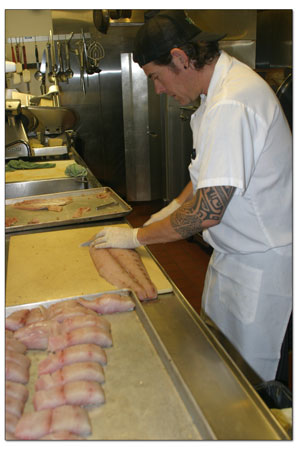
Lucas Webster takes an order during the lunch rush at Zia Taqueria north on Tuesday. Zia, which has 40 employees at its two locations, was recently recognized as a living wage employer by Thrive! Living Wage Coalition. According to Thrive, a living wage in La Plata County is $12.40 hour, achievable through base pay and a combination of benefits, including housing or transportation costs, or meals./ Photo by Jennaye Derge
A workable solution
New organization seeks to raise awareness around livable wages
by Missy Votel
The long-running joke in Durango is that one can tell a real local by the number of jobs he or she has. But for those struggling to get by on minimum wage – currently $8 per hour in Colorado, or $4.98 for tipped employees – the joke may be getting old.
According to calculations developed in part by the Region 9 Economic Development District, the cost of living in La Plata County in 2014 is $25,792 for a single adult and nearly triple that – $76,960 – for a family of four.
Some simple math shows a typical full-time 40-hour week job (equating to 2,080 hours a year) at $8 an hour isn’t going to cut it. In fact, in order to meet living expenses in La Plata County, a single adult would need to make 64 percent more than that, to the tune of $12.40 an hour.
But before you turn tail back to the city, sell a kidney or get even more jobs, you are not alone. Nearly a third of the local workforce earns below the livable wage.
However, a new nonprofit organization, Thrive! Living Wage Coalition, is hoping to call attention to the issue while recognizing local employers that pay a livable wage.
“The overall goal is to see people in La Plata County making a livable wage,” Program Coordinator and co-founder Maureen Maliszewski said. “All working people deserve to be paid a living wage, from a moral and human perspective.”
Maliszewski, a transplant from Buffalo, N.Y., said the gap between income and living expenses in La Plata County is something she is intimately familiar with. “I found myself having to work another 10 years longer than I wanted to,” she said. “And I know a lot of people who have had to leave here because of high housing prices. Housing is a huge issue.”
Maliszewski also rejected the myth that most local low-wage earners are college kids who blow their paychecks on beer and don’t merit higher pay. “I don’t believe that’s true,” she said. “People finish college, and would like to settle down and live here long term, but they can’t do it.”
 A member of the kitchen staff at Eolus prepares fresh fish for the evening’s menu. Eolus and 20 other local businesses have become part of the Thrive! Living Wage Coalition’s “Employer Recognition Program.”/ Courtesy photo |
And while local governments and organizations are helping to address the housing issue, Maliszewski said the income side of the equation has been somewhat ignored. “No one has been looking at the wage piece,” she said.
Maliszewski became interested in the idea of promoting livable wages as an offshoot of the 2008 La Plata County Child and Master Plan, which outlined establishing a livable wage here by 2012. Unfortunately, when the economic recession hit, the idea lost funding and steam, and fell to the wayside in favor of more pressing issues. However, the idea gained new life recently when Maliszewski listened to a lecture on wages and economics by local retired academian, Ron Garst. At the time, Maliszewski was a member of the Social Justice Committee at the Unitarian Universalist Church, where the lecture was held. “I felt like we needed to do something about it,” she recalled.
Over the next few months, she started meeting with a group of like-minded people, and eventually, she left her post with the Social Justice Committee to spearhead the Living Wage Coalition.
She said the organization, which operates under the umbrella of the San Juan Resource Conservation and Development Council, is “loosely formed” – it has no specific Board of Directors but a steering committee is currently being formed – on purpose.
“We wanted it to be inclusive,” she said.
To that effect, the coalition reached out to local low-wage earners with a community picnic this summer and also has been reaching out to local companies with the Employer Recognition Program. That program seeks to recognize local employers who pay workers at last $12.40 an hour in straight pay or associated benefits, such as housing, child care, transportation or meals.
“We decided that was the best approach to maybe raise some awareness of what a livable wage is,” said Maliszewski, adding that the idea is not to be punitive, but appreciative.
Starting on Sept. 10, Maliszewski sent out more than 100 letters to local businesses, followed up by a phone call, explaining the program. She said the response was enthusiastic, with 20 businesses participating in the program. Other businesses that did not meet the criteria but expressed interest are offered the “aspiring livable wage” moniker, which includes free counseling on ways to meet the $12.40 minimum wage from the Small Business Development Center at Fort Lewis College.
James Allred, owner of Eolus restaurant, is among the local businesses that was certified as a Livable Wage Employer. His Main Avenue fine dining establishment employs about 25 people, with most of the kitchen and front of house staff working full time. A living wage is achieved with a combination of base pay for kitchen staff, free meals and the pooling of tips for front-of-house staff, he said. In addition to helping his workers eke out a decent living, he said providing a livable wage also helps in retaining staff. “Turn over is brutal,” he said, adding that it is costly not only in money but time to interview, hire and train new workers.
Paying a livable wage also helps with employee morale, something he remembers from his time earning an hourly wage as a server. “It’s important to feel valued in the service industry,” he said. “It helps people feel good about making a living. I want people to enjoy working here.”
Zia Taqueria is another participant in the program. As a “fast casual” restaurant, it has a different set of challenges than other, more formal restaurants.
“Zia and other fast-service restaurants operate on slimmer overall margins than fine dining establishments, but at the end of the day, it is an owner’s decision to control labor costs, relative to gross revenue,” owner Tim Turner said.
The restaurant has implemented an approach that best fits the needs of its 40-member staff and a sustainable business, he said. “It’s a combination of base pay, tips, performance bonuses, meals, employee discounts, ski passes, flexible schedules, holiday bonuses, loans, good shoes, bikes and genuine appreciation of our staff.”
He admitted that defining a “living wage” is challenging, as everyone’s situation and relationship with money is different and each business has its own set of financial circumstances. But there are some common denominators that working people in La Plata County must deal with. “Durango is an expensive place to live, and it is our responsibility as an employer to provide our staff with a compensation program that helps them to live in this community,” Turner said.
Both Turner and Allred agreed that if the program inspires other businesses to make an effort to do the same, it will be a good thing.
“It seemed like participating in the program was something we could do to help out the community,” said Allred. “We’re all in it together, here.”
For more information on Thrive! Living Wage coalition or the Employer Recognition Program, go to www.thrivelaplata.org.
In this week's issue...
- January 25, 2024
- Bagging it
State plastic bag ban is in full effect, but enforcement varies
- January 26, 2024
- Paper chase
The Sneer is back – and no we’re not talking about Billy Idol’s comeback tour.
- January 11, 2024
- High and dry
New state climate report projects continued warming, declining streamflows
